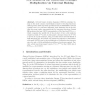Free Online Productivity Tools
i2Speak
i2Symbol
i2OCR
iTex2Img
iWeb2Print
iWeb2Shot
i2Type
iPdf2Split
iPdf2Merge
i2Bopomofo
i2Arabic
i2Style
i2Image
i2PDF
iLatex2Rtf
Sci2ools
STACS
2001
Springer
2001
Springer
New Bounds on the OBDD-Size of Integer Multiplication via Universal Hashing
Abstract. Ordered binary decision diagrams (OBDDs) nowadays belong to the most common representation types for Boolean functions. Although they allow important operations such as satisfiability test and equality test to be performed efficiently, their limitation lies in the fact that they may require exponential size for important functions. Bryant [8] has shown that any OBDD-representation of the function MULn−1,n, which computes the middle bit of the product of two n-bit numbers, requires at least 2n/8 nodes. In this paper a stronger bound of 2n/2 /61 is proven by a new technique, using a recently found universal family of hash functions [23]. As a result, one cannot hope anymore to find reasonable small OBDDs even for the multiplication of relatively short integers, since for only a 64-bit multiplication millions of nodes are required. Further, a first non-trivial upper bound of 7/3 · 24n/3 for the OBDD size of MULn−1,n is provided.
64-bit Multiplication Millions | Binary Decision Diagrams | Common Representation Types | STACS 2001 | Theoretical Computer Science |
| Added | 30 Jul 2010 |
| Updated | 30 Jul 2010 |
| Type | Conference |
| Year | 2001 |
| Where | STACS |
| Authors | Philipp Woelfel |
Comments (0)

